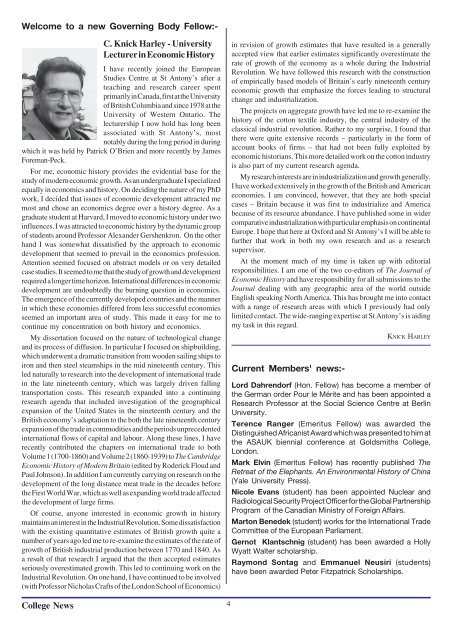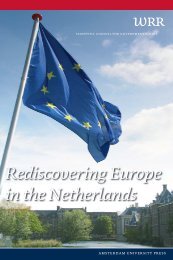Spring 2005 - St Antony's College - University of Oxford
Spring 2005 - St Antony's College - University of Oxford
Spring 2005 - St Antony's College - University of Oxford
Create successful ePaper yourself
Turn your PDF publications into a flip-book with our unique Google optimized e-Paper software.
Welcome to a new Governing Body Fellow:-<br />
I have recently joined the European<br />
<strong>St</strong>udies Centre at <strong>St</strong> Antony’s after a<br />
teaching and research career spent<br />
primarily in Canada, first at the <strong>University</strong><br />
<strong>of</strong> British Columbia and since 1978 at the<br />
<strong>University</strong> <strong>of</strong> Western Ontario. The<br />
lecturership I now hold has long been<br />
associated with <strong>St</strong> Antony’s, most<br />
notably during the long period in during<br />
which it was held by Patrick O’Brien and more recently by James<br />
Foreman-Peck.<br />
For me, economic history provides the evidential base for the<br />
study <strong>of</strong> modern economic growth. As an undergraduate I specialized<br />
equally in economics and history. On deciding the nature <strong>of</strong> my PhD<br />
work, I decided that issues <strong>of</strong> economic development attracted me<br />
most and chose an economics degree over a history degree. As a<br />
graduate student at Harvard, I moved to economic history under two<br />
influences. I was attracted to economic history by the dynamic group<br />
<strong>of</strong> students around Pr<strong>of</strong>essor Alexander Gershenkron. On the other<br />
hand I was somewhat dissatisfied by the approach to economic<br />
development that seemed to prevail in the economics pr<strong>of</strong>ession.<br />
Attention seemed focused on abstract models or on very detailed<br />
case studies. It seemed to me that the study <strong>of</strong> growth and development<br />
required a longer time horizon. International differences in economic<br />
development are undoubtedly the burning question in economics.<br />
The emergence <strong>of</strong> the currently developed countries and the manner<br />
in which these economies differed from less successful economies<br />
seemed an important area <strong>of</strong> study. This made it easy for me to<br />
continue my concentration on both history and economics.<br />
My dissertation focused on the nature <strong>of</strong> technological change<br />
and its process <strong>of</strong> diffusion. In particular I focused on shipbuilding,<br />
which underwent a dramatic transition from wooden sailing ships to<br />
iron and then steel steamships in the mid nineteenth century. This<br />
led naturally to research into the development <strong>of</strong> international trade<br />
in the late nineteenth century, which was largely driven falling<br />
transportation costs. This research expanded into a continuing<br />
research agenda that included investigation <strong>of</strong> the geographical<br />
expansion <strong>of</strong> the United <strong>St</strong>ates in the nineteenth century and the<br />
British economy’s adaptation to the both the late nineteenth century<br />
expansion <strong>of</strong> the trade in commodities and the periods unprecedented<br />
international flows <strong>of</strong> capital and labour. Along these lines, I have<br />
recently contributed the chapters on international trade to both<br />
Volume 1 (1700-1860) and Volume 2 (1860-1939) to The Cambridge<br />
Economic History <strong>of</strong> Modern Britain (edited by Roderick Floud and<br />
Paul Johnson). In addition I am currently carrying on research on the<br />
development <strong>of</strong> the long distance meat trade in the decades before<br />
the First World War, which as well as expanding world trade affected<br />
the development <strong>of</strong> large firms.<br />
Of course, anyone interested in economic growth in history<br />
maintains an interest in the Industrial Revolution. Some dissatisfaction<br />
with the existing quantitative estimates <strong>of</strong> British growth quite a<br />
number <strong>of</strong> years ago led me to re-examine the estimates <strong>of</strong> the rate <strong>of</strong><br />
growth <strong>of</strong> British industrial production between 1770 and 1840. As<br />
a result <strong>of</strong> that research I argued that the then accepted estimates<br />
seriously overestimated growth. This led to continuing work on the<br />
Industrial Revolution. On one hand, I have continued to be involved<br />
(with Pr<strong>of</strong>essor Nicholas Crafts <strong>of</strong> the London School <strong>of</strong> Economics)<br />
<strong>College</strong> News<br />
C. Knick Harley - <strong>University</strong><br />
Lecturer in Economic History<br />
in revision <strong>of</strong> growth estimates that have resulted in a generally<br />
accepted view that earlier estimates significantly overestimate the<br />
rate <strong>of</strong> growth <strong>of</strong> the economy as a whole during the Industrial<br />
Revolution. We have followed this research with the construction<br />
<strong>of</strong> empirically based models <strong>of</strong> Britain’s early nineteenth century<br />
economic growth that emphasize the forces leading to structural<br />
change and industrialization.<br />
The projects on aggregate growth have led me to re-examine the<br />
history <strong>of</strong> the cotton textile industry, the central industry <strong>of</strong> the<br />
classical industrial revolution. Rather to my surprise, I found that<br />
there were quite extensive records – particularly in the form <strong>of</strong><br />
account books <strong>of</strong> firms – that had not been fully exploited by<br />
economic historians. This more detailed work on the cotton industry<br />
is also part <strong>of</strong> my current research agenda.<br />
My research interests are in industrialization and growth generally.<br />
I have worked extensively in the growth <strong>of</strong> the British and American<br />
economies. I am convinced, however, that they are both special<br />
cases – Britain because it was first to industrialize and America<br />
because <strong>of</strong> its resource abundance. I have published some in wider<br />
comparative industrialization with particular emphasis on continental<br />
Europe. I hope that here at <strong>Oxford</strong> and <strong>St</strong> Antony’s I will be able to<br />
further that work in both my own research and as a research<br />
supervisor.<br />
At the moment much <strong>of</strong> my time is taken up with editorial<br />
responsibilities. I am one <strong>of</strong> the two co-editors <strong>of</strong> The Journal <strong>of</strong><br />
Economic History and have responsibility for all submissions to the<br />
Journal dealing with any geographic area <strong>of</strong> the world outside<br />
English speaking North America. This has brought me into contact<br />
with a range <strong>of</strong> research areas with which I previously had only<br />
limited contact. The wide-ranging expertise at <strong>St</strong> Antony’s is aiding<br />
my task in this regard.<br />
4<br />
Current Members' news:-<br />
KNICK HARLEY<br />
Lord Dahrendorf (Hon. Fellow) has become a member <strong>of</strong><br />
the German order Pour le Mérite and has been appointed a<br />
Research Pr<strong>of</strong>essor at the Social Science Centre at Berlin<br />
<strong>University</strong>.<br />
Terence Ranger (Emeritus Fellow) was awarded the<br />
Distinguished Africanist Award which was presented to him at<br />
the ASAUK biennial conference at Goldsmiths <strong>College</strong>,<br />
London.<br />
Mark Elvin (Emeritus Fellow) has recently published The<br />
Retreat <strong>of</strong> the Elephants. An Environmental History <strong>of</strong> China<br />
(Yale <strong>University</strong> Press).<br />
Nicole Evans (student) has been appointed Nuclear and<br />
Radiological Security Project Officer for the Global Partnership<br />
Program <strong>of</strong> the Canadian Ministry <strong>of</strong> Foreign Affairs.<br />
Marton Benedek (student) works for the International Trade<br />
Committee <strong>of</strong> the European Parliament.<br />
Gernot Klantschnig (student) has been awarded a Holly<br />
Wyatt Walter scholarship.<br />
Raymond Sontag and Emmanuel Neusiri (students)<br />
have been awarded Peter Fitzpatrick Scholarships.
















